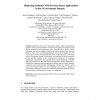Free Online Productivity Tools
i2Speak
i2Symbol
i2OCR
iTex2Img
iWeb2Print
iWeb2Shot
i2Type
iPdf2Split
iPdf2Merge
i2Bopomofo
i2Arabic
i2Style
i2Image
i2PDF
iLatex2Rtf
Sci2ools
JODS
2008
2008
Deploying Semantic Web Services-Based Applications in the e-Government Domain
Joining up services in e-Government usually implies governmental agencies acting in concert without a central control regime. This requires to the sharing scattered and heterogeneous data. Semantic Web Service (SWS) technology can help to integrate, mediate and reason between these datasets. However, since a few real-world applications have been developed, it is still unclear which are the actual benefits and issues of adopting such a technology in the e-Government domain. In this paper, we contribute to raising awareness of the potential benefits in the e-Government community by analyzing motivations, requirements and expected results, before proposing a reusable SWS-based framework. We demonstrate the application of this framework by showing how integration and interoperability emerge from this model through a cooperative and multi-viewpoint methodology. Finally, we illustrate added values and lessons learned by two compelling case studies: a change of circumstances notification syst...
Related Content
| Added | 13 Dec 2010 |
| Updated | 13 Dec 2010 |
| Type | Journal |
| Year | 2008 |
| Where | JODS |
| Authors | Alessio Gugliotta, John Domingue, Liliana Cabral, Vlad Tanasescu, Stefania Galizia, Rob Davies, Leticia Gutiérrez-Villarías, Mary Rowlatt, Marc Richardson, Sandra Stincic |
Comments (0)

